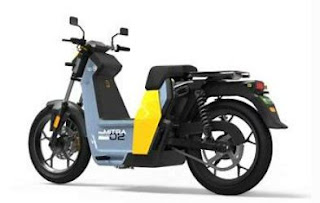5 Tips To Keep In Mind Before Buying Your First 2-Wheeler EV
The age of electric mobility has arrived, and it's sweeping across the world. Electric vehicles (EVs) are no longer just a futuristic concept; they are becoming a practical choice for daily commuting. In India, this revolution is particularly evident in the 2-wheeler segment. With a growing awareness of environmental concerns and the need for sustainable transportation, many are considering the switch from traditional petrol bikes to electric 2-wheelers. But the question that lingers is, "Is a 2-wheeler EV more cost-effective than a usual petrol bike?"
Cost efficiency is a primary concern for any vehicle owner, and it's no different when it comes to electric 2-wheelers. To determine whether an EV is more cost-effective than a petrol bike, you need to consider various factors. These include -
Initial Cost - Electric 2-wheelers typically have a higher upfront cost than their petrol counterparts. The cost of the battery, which is a significant part of the EV, contributes to this disparity. However, the initial cost of an EV can be offset by government incentives, subsidies, and reduced operational expenses.
Running Costs - This is where electric 2-wheelers shine. According to a report by The International Council on Clean Transportation, electric two-wheelers in India are expected to become more cost-effective than petrol bikes by 2025. Moreover, EV Reporter states that the running cost of an electric scooter in India is effectively Rs. 2.0 per kilometre, which is significantly lower than the running cost of a petrol bike.
EVs have fewer moving parts, require less maintenance, and electricity is generally cheaper than petrol. This translates into substantial long-term savings for electric 2-wheeler owners.
Charging Infrastructure - One of the most critical aspects of EV ownership is charging infrastructure. Unlike petrol bikes that can be refuelled at any petrol station, EVs need a reliable and accessible charging network. India has made substantial progress in expanding its EV charging infrastructure. The government has released revised guidelines and standards for charging infrastructure in 2022 and plans to set up 2,877 charging stations in 68 cities across 25 states by 2024. This indicates a promising future for EV charging accessibility.
Incentives and Subsidies - To promote EV adoption, the Indian government offers various incentives and subsidies. These can significantly reduce the initial cost of an electric 2-wheeler. For this, the Faster Adoption and Manufacturing of Electric Vehicles in India (FAME-II) initiative has earmarked a substantial fund of Rs. 10,000 crore to foster the growth of EV charging infrastructure in the country. Additionally, some state governments provide additional incentives, such as reduced road tax and registration fees.
Resale Value - Resale value is often a concern when buying any vehicle. While electric 2-wheelers are relatively new in the market, they are expected to retain their value well. As the technology matures and more people transition to EVs, the resale market for electric 2-wheelers is likely to grow.
Tips for Buying Your First 2-Wheeler EV
Carefully considering essential tips form the foundational blueprint for ensuring a seamless and satisfying electric 2-wheeler ownership experience. By paying heed to these considerations, you can confidently navigate the EV landscape and make an informed choice that aligns with your needs, preferences, and the future of sustainable mobility.
1. Evaluate Your Daily Commute
Consider the distance you travel daily. Electric 2-wheelers are ideal for short to moderate commutes. If your daily travel falls within the range of the EV you're considering, it's a practical choice.
2. Check Charging Infrastructure
Ensure that there are reliable charging stations in your vicinity. Easy access to charging infrastructure is crucial for making your EV ownership experience convenient and worry-free.
3.Research Government Incentives
Take some time to explore the various incentives and subsidies offered by both the central and state governments. These can significantly reduce the initial cost of your electric 2-wheeler and make it more affordable.
4. Test Ride Multiple Models
Patience is key when making this decision. Don't rush it. Test riding different electric 2-wheelers allows you to experience their performance, comfort, and handling firsthand. This helps you find the model that aligns best with your unique needs and preferences.
5. Plan for Battery Replacement
While EV batteries are known for their durability, it's wise to understand the battery warranty and the eventual cost of battery replacement. Being prepared for this aspect ensures you can enjoy your electric 2-wheeler for the long term without unexpected financial surprises.
Following these tips will enable you to take advantage of the cost-effectiveness of a 2-wheeler EV compared to a traditional petrol bike, especially in the Indian market. With lower running costs, government incentives, and a growing charging infrastructure, electric 2-wheelers are becoming an attractive option.






